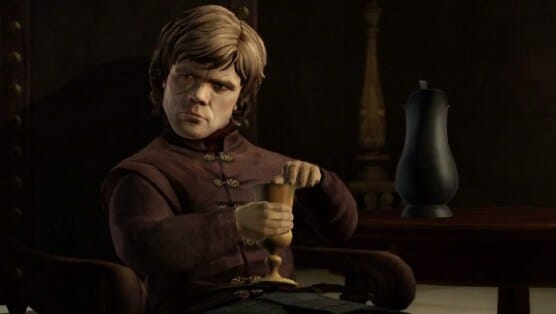Game of Thrones Episode 1: Iron From Ice—A Family Affair

The first episode of Telltale’s adaptation of Game of Thrones is, at once, one of the developer’s most ambitious, boldest adaptations as well as one of its most derivative ones.
Telltale takes great strides within the first thirty minutes to let the player know that this game is meant to be bigger than any game they’ve done before, not focusing on a duo of characters as previous games have (Lee/Clementine, Bigby/Snow, Fiona/Rhys) but instead rotating three characters, possibly more in future episodes, in order to emulate the character and location transitions of George R. R. Martin’s novels and HBO’s television series. The focus, then, leads away from developing a strong relationship between the aforementioned duos and instead on examining the effects that a player’s choices have, not just on the world, but on other characters the player inhabits as well. It’s a gambit, and it’s not one that I’m entirely sure will work, but it is neat to make the decision for Gared the squire to do something rather nasty—either out of survival or spite—and then to play as young lord Ethan having to deal with the consequences of that decision.
It’s a marvelous technical display to watch, and the artistry of it is appreciated, and yet I have no strong feelings for any of House Forrester, mostly because they’re blatant, hollow imitations of the Stark family. The Forresters, being loyal to house Stark, become embroiled in a dangerous situation in the aftermath of The Red Wedding. If none of the words in the previous sentence make sense, then you should skip the game entirely, catch up on the show, or read some long summaries on a wiki. Iron From Ice assumes that the player is already well acquainted with the source material, something that The Wolf Among Us and The Walking Dead did not do, and refuses to give you a refresher course on the first three seasons of the show. There’s something admirable about that, I suppose, aspiring to be fearlessly complex, not talking down to your audience, expecting them to do some of the legwork. And yet, the game, while brave enough to do that in the first place, fills the space freed up by summary expositions…with more expositions, like lengthy conversations that explain the relationships amongst the playable trio. Heck, even interacting with the environment leads to exposition. For example, clicking on a family painting hanging above a mantle will lead you to having to click on the figures in the painting in order to learn some history about each one, which you need to do if you hope to understand how and why everyone is connected.
 Keep scrolling for more great stories.
Keep scrolling for more great stories.

